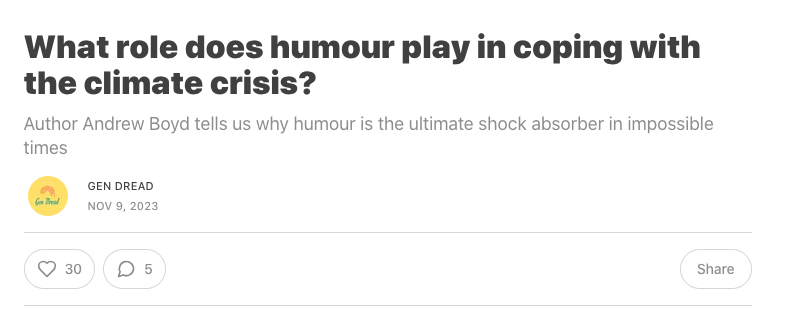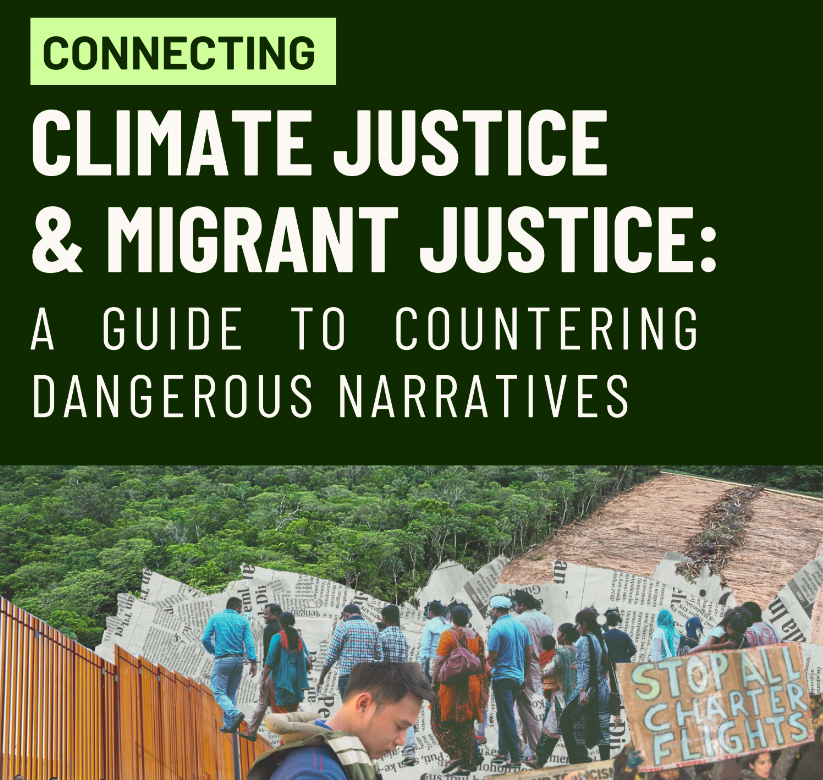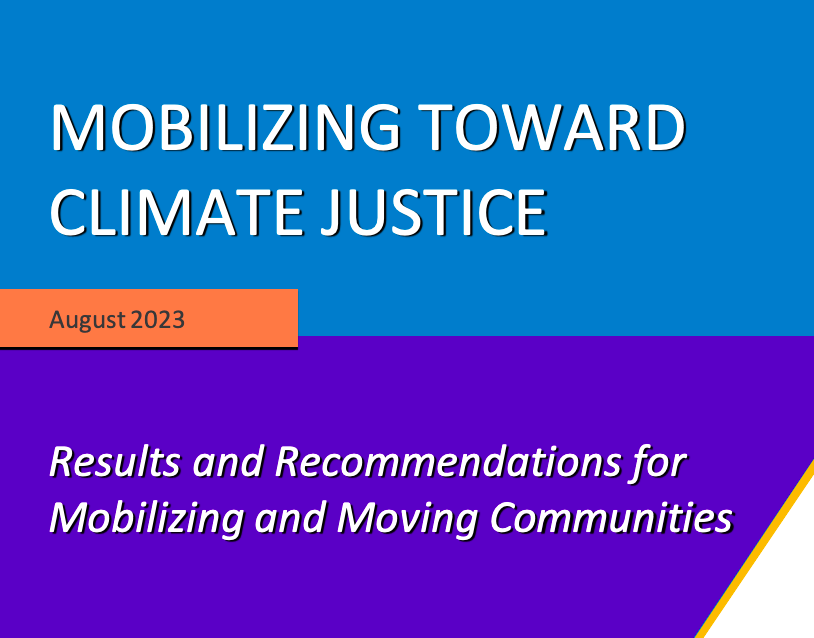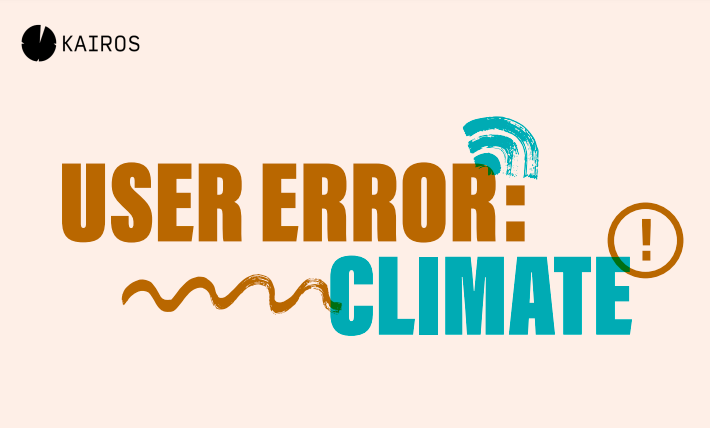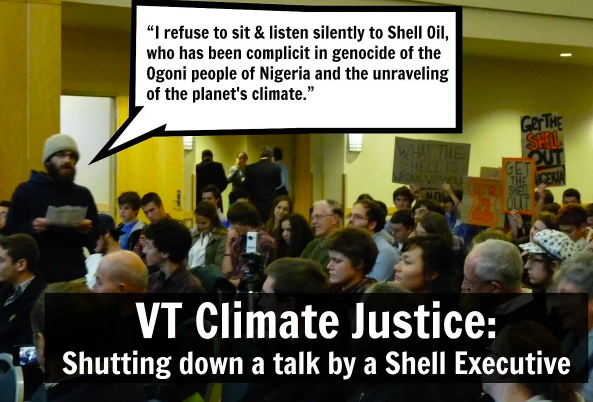Resources
Search below for resources covering the intersection of climate engagement, social science and data analytics.
RESULTS
What role does humour play in coping with the climate crisis?
Humor is the ultimate shock absorber in impossible times. “I Want a Better Catastrophe” is the title of Andrew Boyd’s new guide to coping with escalating climate change. And if you’re anything like us, it fills you with dread and sadness and fear…but does it also make you laugh? Maybe a little? Or maybe right out loud? And notice how your body changes. The light shifts. It suddenly feels a little more doable, a little more possible, to hold the full weight of this crisis we’ve created. To open the book. To start at the beginning. To do the work. The awful, terrifying work. Gen Dread talked to Andrew about where, how, and why he derives humor from such a bleak situation, and what his approach can offer all of us who are trying our best to cope.
Later Is Too Late
In message testing across 23 countries, our responsibility to future generations consistently ranks as the most compelling rationale for climate action. In this experiment, the narrative focused on protecting future generations produced the biggest lift in support for climate action in every country surveyed. Comparing the level of strong support (5 on a 1-5 scale) for government climate action by the groups exposed to each of these narratives, versus the control group who saw no narrative, reveals the “lift” that each narrative generates. The differences are clear. Averaged across all 23 countries, the generational urgency narrative lifts support by 11 percentage points; polluter accountability lifts support by 7 percentage points; and the climate progress narrative lifts support by just 3 percentage point. The generational urgency narrative is the winning narrative in each country, as well as overall.
Transforming the Rural Narrative on Climate Solutions
Join the Rural Climate Partnership for a presentation on how we can use a benefits-forward narrative strategy to connect with rural people. Together, we'll explore 5 narrative keys that allow communicators to reach across cultural differences and avoid culture war frames to connect on shared values.
The Tomato Soup “Controversy”
The climate movement is getting more confrontational—is it working? In October 2022, activists with the group Just Stop Oil in the UK threw tomato soup at Van Gogh’s famous painting, “The Sunflowers,” in the National Gallery in London, then glued themselves to the wall under the painting, asking onlookers “What is worth more, art or life?” Within 24 hours most major media outlets had covered the protest in some way. Many covered it multiple times over the course of several weeks. It also inspired multiple copycat actions, with activists throwing mashed potatoes on a Monet in Germany, and pea soup on another Van Gogh in Italy. While the reaction to “Soupgate” seemed over the top, it’s also not terribly surprising that people were upset by it, because shock was the point, according to Dana Fisher, a sociologist. Part of the point of what researchers call the “radical flank” of any movement is to get this sort of reaction.
Communicate about climate-linked migration through justice-based framing to counter dangerous anti-migrant narratives. Dangerous narratives use fear- or threat-based language or framing of migrants in an attempt to accelerate climate action, while scapegoating the most vulnerable people. Use these principles to frame climate and migration. Lead with values: Humans have always moved for safety. Name the villain: Talk about how governments and corporations are profiting from abuse against migrants and refugee. Share the vision: Articulate the right to stay and the right to move.
How to incorporate climate justice in the language classroom
Language teachers have a key role in ensuring that students not only engage with the climate crisis but with climate justice too. Developing students’ understanding of these cause-and-effect connections that affect people around the world is just one of the aspects to focus on the language classroom to raise awareness of climate justice. To engage students and teach them the importance of cross-disciplinary collaborations, consider teaming up with other teachers for projects and involve students in decision making as much as possible.
Mobilizing Toward Climate Justice
Mobilize community members as a choir in support of robust climate interventions that center people of color and exert pressure on elected leaders, government agencies, and corporations to put renewable and regenerative power in the hands of impacted communities. The following messaging guidance is helpful. Frame the issues and impacts of the climate crisis in terms of lived experience and creation of good as opposed to removal of something bad or abstract ideas. Use active voice – name culprits and provide origin story for the climate crisis. Lead with the experience and solutions that communities of color bring to addressing climate change rather than the harms that disproportionately impact them. Focus on how public utilities can lower costs, provide more reliable energy, and empower the community. Call out corporations and their greed. Don’t use comparison to existing public goods. Share positive stories of publicly owned utilities. Avoid naming disparities without assigning blame. Effective culprits here are corporate CEOs, fossil fuel corporations, wealthy few who profit off polluting our communities. Link action to past victories and power of collective action (i.e. “the many can defeat the money”). Give examples of what solutions that prioritize communities of color look like. Combine calls to action, such as holding fossil fuel corporations accountable, with a vision for the better future we will create. Give people political actions to take or they will default just to direct aid. Make it clear who is at fault for the disasters that we face.
User Error: Climate
This report explores Big Tech’s actions that feed the climate crisis. Big Tech’s actions include: allowing disinformation to flourish online; providing cloud services to help oil and gas companies pump more fossil fuels; participating in trade organizations that lobby against policies that would help the US shrink emissions; producing ever-growing emissions of their own; and funding and promoting false solutions. This report ends with demands for Big Tech to stop these actions that fund the worsening of the climate crisis. To fight the climate crisis, Google, Meta, Microsoft, Apple, and Amazon need to: support policies that help the U.S. end its reliance on fossil fuels; withdraw from trade groups that lobby against climate mitigation; support climate mitigation efforts that have grassroots support, like shrinking fossil fuel and other polluting industries to cut greenhouse gas emissions at their source; stop providing cloud services to oil and gas companies; eliminate climate disinformation on your platforms; and create and follow measurable plans to get to carbon-zero, not ones based on speculative tech and wishful thinking.
Actions > Awareness
Actions are our best tools for generating awareness—and not the other way around. There’s some fascinating evidence that makes the case for why actions are our best tools for generating awareness that comes from the pro-life movement. This resource is Chapter 29 from a book project called "Rough Waters Ahead: Holding on for Young & Rising Climate Change Activists." Sociologist Ziad Munson studied how anti-abortion activists first got involved, and Munson found that 23% of anti-abortion activists were pro-choice and 20% were undecided on abortion access when they attended their first event. What led these moderate of liberal-leaning people to join the pro-life movement? Munson argued that it was relationships and feeling part of a bigger whole that helped people gel into their anti-abortion beliefs. Munson also found that people who evolved into an anti-abortion activist were more likely to be at a significant turning point in their life, such as recently graduating high school or college, moving to a new city, starting a new family, or newly retiring. PowerLabs movement support group has also similarly found that direct, political actions change people’s minds and create new awareness—not the other way around.
Choose Both
Choose Both is a collection of movement builders, supporters, and mobilizers helping partners realize a more open, just, and habitable world. They believe that pursuing equity for marginalized folks is the only way to get there. They work with storytellers, campaigners, designers, and more transforming the way that organizations and initiatives take on racial equity as an impact priority. Choose Both identified 5 key decision-points where these partners can choose both equity and evidence to strengthen their impact. First, choose goals that both capture new visions and meet existing needs. Second, choose storytelling that’s both emotional and technical. Third, choose to reach both loyal audiences and new communities. Fourth, choose to both consider data and challenge bias. Fifth, choose reporting that both inspires your own community and accounts for others.
Pagination
- Previous page
- Page 2
- Next page
